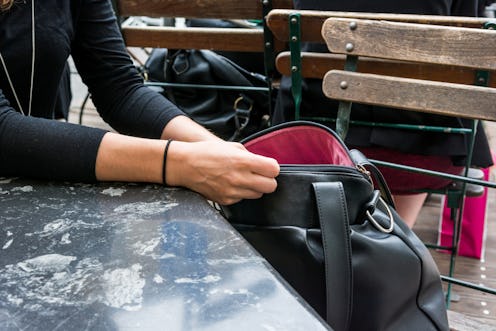Life

We all lose things occasionally. From typical things like car keys to slightly more puzzling items like left-hand boots (seriously, I haven't found that boot since 2009), asking yourself why you're constantly losing things is exceedingly common. Thankfully, technology is moving to fill the breach; it's now possible to track your luggage internationally, and everybody's getting in on apps and miniature devices to track their possessions. University of California scientists have even invented "smart tags" to connect ordinary objects to WiFi and help locate them. But if you'd rather do things the old-fashioned way, there are actually psychological hacks to help you locate the things you constantly misplace.
Interestingly, studies have revealed that women are actually better at tracking their possessions than men are. This might be partially explained by an emotional labor issue: as partners and mothers, we're often in charge of remembering where everybody has left their stuff, so we're more likely to know in general. But that still means things occasionally get left somewhere unknown and aren't recovered for ages. If your own techniques — putting items in a "safe place", for instance — aren't getting results, here are some psychological hacks to help you improve your memory retention when it comes to their location.
1
Encode Their Location
The key psychological trick to remembering the location of an item, according to experts, is "encoding". This sounds complicated, but it's just a reference to the practice of paying attention. Think of the location of your car keys as a bit of information you have to solidify into your brain, rather than a thing you'll "probably" remember. Actually think about it. Say, "I have left my car keys on the hall table" to yourself. The more encoded the information is, the easier it is for you to retrieve later.
2
Use A Mantra
Are you a verbal learner? Do you tend to get songs stuck in your head? A mantra about where your thing is might help. Make up a little chant — "the phone is by the kettle, the phone is by the kettle, the phone is by the kettle" — and it might help the encoding process by embedding the information in a catchy way.
3
Be Mindful When You're Putting Things Away
This is a key part of the encoding process: be mindful. This term means paying attention rather than multitasking or flinging stuff willy-nilly. If you notice that you always misplace something in particular, next time you have it and are about to put it down, pause, take a second and focus on what's happening. Building up a "mental map" of locations, as experts call them, seems to depend heavily on our attention.
4
Don't Bother With Memory-Training Tools
Scientists in 2017 looked at all the available studies done on memory-training tools, which claim to use the brain like a "muscle" and make it better at memory-related tasks like remembering where things are. Unfortunately, they discovered that the evidence suggests these tools aren't much use. So if you're constantly losing things, you're better off changing your behavior than attempting to use apps to boost your memory.
5
Use "Designated Places"
If you want to remember where everyday things are, adjusting your environment towards that goal is also a good hack. According to Stever Robbins, a productivity expert quoted in the Washington Post in 2017, one of the best ways to locate things is to make sure you have a single area you put them every time: a designated place. This goes for both your house — where things like ring bowls, phone stands and earring trees are a good investment — and for being out in the world. In an unfamiliar office? Always put your phone to the left of you, for instance. Designated places make it easier to track where things might be.
6
Use Signals That Might Prompt Emotional Responses
Memory is very tied into our emotional responses; studies have shown that we're more likely to remember things when we have some kind of emotional reaction to them, whether they're scents, noises, or images. This isn't necessarily a technique that might work every day, but if you're putting away something serious and need to remember where it is, like your tax paperwork or a family heirloom, try to encode it in your mind with some kind of feeling or emotional memory. Tie the object and where you've put it with that feeling, and it should be easier to access the location next time you need it.
7
Vividly Recall What You Were Doing At The Time
If all else fails, experts recommend that you try and go back to the moment when you last had the object. But it goes further than retracing your steps: because of the nature of human memory, you'll have more luck if you can also remember how you were feeling, what had just happened, what you were looking forward to, and other aspects of your mental state. Recreating all those emotional aspects, according to memory studies, will make you more likely to access how you moved and where you put things, even if you weren't paying attention at the time.
8
If you take one lesson away from these hacks, it's that trying to be mindful about where you put things will save you time in the end. It might seem like an odd thing to do at the time, but slowing down and noticing where you place your keys, charger, necklace, or passport will eliminate the many minutes of panicky searching when you need to find them again.